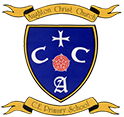Phonics and Early Reading
At Aughton Christ Church, we aim to develop confident, fluent and passionate readers and writers from an early stage. We teach phonics using the validated 'Essential Letters and Sounds’ complete systematic synthetic phonics programme (SSP). At Aughton Christ Church, phonics is taught daily as part of an early learning environment that is rich in talk and story, where children experience the joy of books and language whilst rapidly acquiring the skills to become fluent independent readers and writers. Through our phonics teaching, children are taught to:
- decode by identifying each sound within a word and blending them together to read fluently.
- encode by segmenting each sound to write words accurately.
Whole-class, daily phonics teaching begins from the first days of Reception. Through our rigorous teaching programme, children build an immediate understanding of the relationship between the sounds they can hear and say (phonemes) and the written sounds (graphemes).
All or phonics teaching follows the same specific sequence that that allows our children to build on their previous phonic knowledge and master specific phonic strategies. As a result, our children are able to tackle any unfamiliar words that they might discover.
Harder to read and spell words are common in the English language and through our phonics programme these words are explicitly modelled at the point where the graphemes have been taught
At Aughton Christ Church, we know that for children to engage with the wider curriculum, they need to be able to read well, make inferences and draw on background knowledge to support their developing understanding of a text when they read. To do this, we ensure that our children are able to draw not only on their phonic knowledge but also on their wider reading and comprehension skills, each of which are taught throughout shared reading and writing outside of the phonics lesson and across the curriculum.
We also have a strong focus on the development of language and language skills for our children because we know that speaking and listening are crucial skills for reading and writing in all subjects
How we Teach Phonics
At Aughton Christ Church:
- We teach whole-class, daily phonics lessons for 30-35minutes from the first days of Reception through to Year One.
- Our phonics teaching follows the same teaching sequence (Show, copy, repeat) and structure (review, teach, practise, apply, review) which ensures that there is rigour, pace and fidelity in every lesson.
- Children are taught in a whole class approach which allows all children to access Quality First Teaching. Interventions happen swiftly during the apply section of the phonics lesson. Children who are falling behind are quickly identified and strategies put in place to ensure they catch up through extra intervention.
- Phonics teaching does not stop at the end of Year 1, but continues as children move through the school, with links being made between the children’s GPC knowledge and spelling Interventions are also provided for those children who need more practice and support and this continues into KS2 where necessary.
- At Aughton Christ Church, we ensure that all staff across school are trained in delivering phonics using the Essential Letters and Sounds Programme so that phonics is taught with fidelity and rigour throughout the school.
- We use 100% decodable books in phonics lessons so that children can directly apply their new knowledge and phonic skills at an appropriate level. We use a range of decodable books which have been carefully organised to match the sounds the children are learning.
- See below for term by term progression of phonics teaching in Reception and Year 1.
Phonics and Reading Books
At Aughton Christ Church, we understand that whilst children are learning to read, it is vital that the books they read are closely matched to their phonic knowledge. In Reception and Year 1, children practise early reading with fully decodable books that:
- are matched to phonic knowledge and which do not require use of alternative strategies.
- are closely matched to the phonics phases.
- are decodable at the child’s current level and not mixed with non-decodable books for independent reading
- include a small number of ‘Harder to Read and Spell’ words which have been taught.
- are continued in the progressive sequence of ‘Essential letters and sounds’ phases until a child can confidently decode words involving most common grapheme representations of all phonemes.
Assessment of Phonics
We assess children’s progress in phonics thoroughly so that any gaps can quickly be identified and to ensure that all children make progress. Daily in-class assessments ensure that any children who are falling behind are quickly identified and strategies put in place to ensure they catch up through extra intervention. Summative assessment also takes place in the fifth week of each half term, to allow all members of staff to target and close any gaps that may be present in either sound knowledge or reading skills.
If necessary further support through targeted interventions is provided for children to enable them to keep up with the phonics programme.
Additional support for phonics is also put in place for those children in KS2 that still require support.
The lowest 20% of children are heard read at least once per week by a teacher or teaching assistant.
Phonics Screening Check
Year One Children participate in the Statutory Phonic Screening Check in the Summer Term.
For more information on how we teach Reading in our school please click here to see our English Policy
